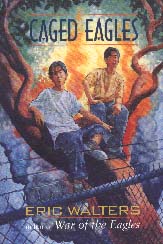|
________________
CM . . . .
Volume VII Number 2 . . . . September 22, 2000
excerpt: I stood stock-still, too shocked to move. What were they doing here . . .what were any of us doing here? The woman with the broom was sweeping up a cloud of dust, and it swirled around, filling the air. I sneezed, and then sneezed again. Wasn't the foul odor bad enough? I stumbled forward. And why was that woman sweeping out that cattle stall?In a sequel to his 1998 award-winning novel, War of the Eagles, Walters focuses on the Fukushima family, allowing 14-year old Tadashi to narrate the story of a shameful period in Canada's history. Declared "enemy aliens" following the 1941 Japanese bombing of Pearl Harbor, Japanese Canadians lost all rights of citizenship. Ordered to leave their homes, thousands of families along the British Columbia coast could take only minimal possessions. Among the displaced, the fishermen from Tadashi's village, Sikima, sail their boats to Prince Rupert and are then towed to Vancouver by naval ship. Later, courtesy of the Canadian government, the boats will be confiscated and sold along with these Japanese Canadians' houses, cars, and other belongings. Their abandoned homes will be looted and trashed. Vancouver's Hastings Park, surrounded by high metal fencing with guarded entrances, becomes home for the detainees who are stripped of identities and possessions. "Names aren't necessary," they are told. "All we require to process people is a number." Authorities separate families from fathers who are placed in barracks. Women and children are housed in cattle stalls - all are forced to eat institutionalized Western food and dehumanized in every conceivable manner. Tadashi meets a two-week veteran of the detention centre, Sam, who acquaints him with the routines and takes him on adventures. Sam's cockiness and street smarts encourage Tadashi to take chances like sneaking through the fence to explore Vancouver. The men play cards, gamble, and drink in their barracks; the women care for the children in their stalls and organize schools for grades 1-7. As the weeks pass, the population of the camp grows from 1500 to more than 3000. Tadashi remarks that the "Japanese are big on things like waiting, being patient, and accepting fate," but even those virtues wear thin as the detention continues. Walters carefully shows the frustration and confusion of Japanese Canadians at the treatment meted out by their government and their fellow citizens. According to Tadashi, "About the most Japanese thing I could think of was working. Wasting time was something that wasn't even considered," yet they face enforced confinement and uncertain futures. Some, separated from their families, will be sent to work camps in abandoned mountain mining towns while others, with their families, will go to farms in Alberta. All face racism and are referred to in the press as heathens, spies, the "yellow peril," and enemy aliens. Tadashi's grandmother often repeats the mantra, "shikata-ga-nai," meaning, "it can't be helped," reflecting another traditional Japanese attitude. Sadly, grandmother succumbs to age and illness and, in a rather curious scene, Walters depicts a traditional Buddhist cremation ceremony within the park which, in the "Afterword," he acknowledges has no historical basis. Likewise Walters fictionalizes a night time raid on the fishing boats moored at Annieville Dyke where Tadashi's father and his fellow fishermen scuttle their boats rather than allow them to be sold. Tadashi is an appealing protagonist and a capable narrator. The plot moves briskly and includes enough action like baseball games, escapes into Vancouver, fights, food boycotts, and night raids to maintain reader interest. Walters successfully combines history, adventure, and social criticism in Caged Eagles while providing young readers a glimpse into Canada's past and a chance to consider serious issues inherent in any complex, multicultural society. Highly Recommended. Darleen Golke works as the teacher- librarian at Fort Richmond Collegiate in Winnipeg, MB.
To comment on this title or this review, send mail to cm@umanitoba.ca.
Copyright © the Manitoba Library Association.
Reproduction for personal use is permitted only if this copyright notice
is maintained. Any other reproduction is prohibited without
permission.
Published by
TABLE OF CONTENTS FOR THIS ISSUE - September 22, 2000.
AUTHORS |
TITLES |
MEDIA REVIEWS |
PROFILES |
BACK ISSUES |
SEARCH |
ORDER |
CMARCHIVE |
HOME
|
